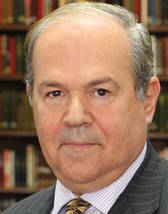Russia’s Government Reshuffle: Changing in order to Make No Change
 Russian President Vladimir Putin has surprised Moscow’s political class by appointing a virtually unknown bureaucrat as his new prime minister.
Russian President Vladimir Putin has surprised Moscow’s political class by appointing a virtually unknown bureaucrat as his new prime minister.
The nomination still has to be ratified by the Russian parliament. But everyone knows that this is a mere formality; the real question is whether Putin’s latest government reshuffle heralds a more fundamental shift in policy.
And all the indications suggest that no change is in the offing: the replacement of prime ministers is just one part of a more complicated manoeuvre designed to ensure that Putin retains all the levers of power.
Under the Russian political system, prime ministers are marginal figures. They are not allowed to be too popular, just in case they become a threat to the president. And, if their popularity declines, prime ministers are easily discarded, in order to protect the president’s reputation.
Judged by these standards, Mikhail Fradkov - the man who served as Russia’s premier for the last three years - was ideal. A political outsider belonging to the country’s Jewish minority, Fradkov could never threaten President Putin.
Although never very popular, Mr Fradkov was regarded as a competent administrator. And he was lucky to serve at a time when the economy boomed, due to high oil and gas prices, Russia’s main export earners. In short, he was everything Putin could expect: loyal, unobtrusive and trouble-free. Nevertheless, Fradkov was unceremoniously dumped this Wednesday.
Since Russia is facing a general election this December and a presidential election next March (when Mr Putin is constitutionally barred from standing), the initial speculation was that Fradkov’s departure was designed to pave the way for the man Mr Putin wants to groom as his successor. After all, that is what happened to Mr Putin himself in 1999, when he briefly became prime minister, before moving into the presidential office.
Two candidates are currently fighting for the presidential seat: Sergei Ivanov – who is supported by the military and the security services – and Dmitry Medvedev, who has the backing of the country’s vast oil and gas concerns. Both are deputy prime ministers, and the expectation was that one of them would be entrusted with running the government.
But, to everyone’s bewilderment, Mr Putin ignored them, opting instead for another outsider.
Viktor Zubkov, the new prime minister who will be 66 this Sunday, headed Russia's anti-money-laundering watchdog. True, he is one of the president’s oldest friends. But, unlike other contenders, he is unconnected to either the security services or the powerful commercial groups.
So, why did President Putin bother to replace a non-entity with another non-entity? Two explanations are possible.
The first is that Moscow really does intend to groom the new prime minister as a future Russian president. The idea here is that because Mr Zubkov has no power base of his own, he will remain a pawn for Mr Putin who would exercise influence after he retires next March. The strategy makes sense: after all, Putin will only be 55 years old on retirement, and no Russian leader has ever given power willingly at the peak of his career.
Yet there is another possibility: that the cabinet reshuffle was simply designed to keep everyone guessing. As the elections approach, Mr Putin risks becoming a lame duck president. So, by appointing a new prime minister, the president makes sure that he retains the maximum room for manoeuvre until the very last moment in office.
Furthermore, although the Russian leader has always pledged to respect the constitution which mandates his retirement, the reality is that he can easily eliminate this provision and give himself another term in office. Opinion polls suggest that Mr Putin remains wildly popular; parliament will rush through changes to the constitution on the slightest hint from the current leader.
The guess is that, at least for the moment, Mr Putin has not made up his mind. But the Russian leader has already achieved his immediate objective: to provoke wild guesses all around.
‘Prime Minister Zubkov is not the future president of Russia’, claimed Vitaly Tretyakov, the editor of the influential Moskovskiye Novosti weekly.
However, Mr Oleg Morozov, the speaker of the Russian parliament, took the opposite view: “It would be logical if the prime minister became a presidential candidate,” he opined. Mr Putin must be enjoying this confusion.
One conclusion, however, is inescapable: Russia’s forthcoming elections will be a cliff-hanger not because the result is bound to be close, but because Mr Putin will only reveal his chosen successor at the last moment. Elections are still decided in Russia before, rather than after the vote. And there is still a chance that Mr Putin may ultimately be succeeded by none other than Putin himself.
Jonathan Eyal
Director of International Security Studies, RUSI
Jonathan Eyal
Associate Director, Strategic Research Partnerships
RUSI International

